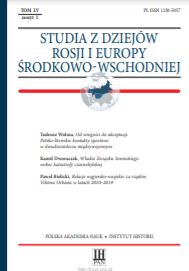Relacje węgiersko-rosyjskie za rządów Viktora Orbána w latach 2010-2019
The Hungarian-Russian Relations under the Premiership of Viktor Orbán in 2010-2019
Author(s): Paweł BielickiSubject(s): Politics, International relations/trade, Present Times (2010 - today)
Published by: Instytut Historii im. Tadeusza Manteuffla Polskiej Akademii Nauk
Keywords: Węgry; Viktor Orbán; Russia; Vladimir Putin; Ukraine; Hungarian-Russian relations; American-Russian relations; relations between Hungary and the EU;
Summary/Abstract: The purpose of the study is to shed light on the conditions and interrelations characteristic of the Hungarian-Russian relations under the premiership of Viktor Orbán from 2010 when he took the position of prime minister to 2019. At the beginning, I present the genesis of establishing contacts by the Hungarian politician with Moscow and the reasons for which Orbán decided to limit economic relations with Western states. Next, I describe the Hungarian-Russian relations after the annexation of the Crimea, and also the contacts with Ukraine, tensed due to the problem of the Hungarian minority and a restraint attitude of Orbán towards the pro-Russian separatists in Donbass. In the next part of the study, I focus on the issue of American-Hungarian relations in the context of contacts between Moscow and Budapest. I discuss the stance of Hungary towards the offensive operations of the Kremlin in Western Europe, including, among other things, attempts at poisoning the former agent of Federal Security Service Sergei Skripal. The next problem is the questions of economic relations between Moscow and Budapest, being the very essence of contemporary cooperation between the states, especially in the area of energy supply. In relation to the latter, I articulated the reasons for which the Hungarian authorities decided to intensify the cooperation with Moscow which jeopardise the unity of Visegrád Group and the European Union. In summary, I try to present the consequences of the analysed phenomena for the contemporary international situation and position of Central Eastern Europe.
Journal: Studia z Dziejów Rosji i Europy Środkowo-Wschodniej
- Issue Year: 55/2020
- Issue No: 1
- Page Range: 199-228
- Page Count: 30
- Language: Polish

